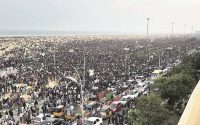Supreme Court orders shutting down mobile tower for causing cancer
Source – bgr.in
Even as experts are still debating over the existence of ‘harmful radiation’ from mobile towers, a Harish Chand Tiwari has succeeded in getting the Supreme Court of India to shut down a mobile tower for causing cancer to him. Gwalior-based Harish alleged that a BSNL tower located less than 50 meters from the house he worked exposed him to radiation that further led to Hodgkin’s Lymphoma.
According to Times of India, a bench of Justices Ranjan Gogoi and Navin Sinha said, “We direct that the particular mobile tower shall be deactivated by BSNL within seven days from today.” This will also be the first time in the country when a mobile tower has been shut down on the ground of radiation.
The decision is expected to start a new round of debate over the possible hazards from the mobile towers. The government and telecom industry body COAI have time and again said that the mobile towers don’t cause radiation. Back in 2014, the industry body also announced a campaign to bust myths around mobile tower radiation. COAI has also cited a few studies on how the concerns around health hazards from mobile towers are baseless.
The biggest backing to COAI’s campaign on mobile tower radiation has come from IT minister Ravi Shankar Prasad. “After detailed study of WHO findings, I found that there is no harmful impact of tower radiation on health. There is no reason to deny it. We have already put tenfold stringent norms for telecom companies in India,” the minister said last year.
The minister further pointed that the government had a Rs 10 lakh fine on those flouting the prescribed limit for radiation from mobile towers. He also said that there was no scientific backing the claims of health hazards due to telecom infrastructure.
It may be recalled that the telecom companies have rued that the closure of mobile towers has led to poor network quality and causing call drops – on which the regulators and government have taken a very strong position.
While Supreme Court’s decision is historic, it’s not the first attempt to get the courts involved in removal of mobile towers. Last year, Bombay High Court commented that there was no radio activity through cell towers and did not cause any health hazard. The court was commenting on a petition filed by actor Juhi Chawla against mobile radiation. In another incident, Delhi High Court dismissed multiple petitions against mobile towers.
The move, however, is likely to have a large implication on the telecom industry. “This is bad news for the telecom industry. Even though the case is an isolated one, the Supreme Court has chosen to reject the argument of a majority of technical and health agencies who insist that mobile radiation is harmless. The court decision is bound to encourage the sceptics. The challenge for the industry and the government is to convince the people at large to rely on scientific research rather than hearsay,” telecom expert Mahesh Uppal told BGR India.
That being said, there are also experts who believe mobile tower radiation is real and is causing problems. “Direction given by Supreme Court is fair and is in larger public interest. The apex court has passed the most appropriate directive. I disagree with the claims that there are no health hazards. The mobile towers are hazardous for health,” Ashok K. Aggarwal, Director General, TSDM (Telecom System Design Manufacturers Association) told BGR India.



